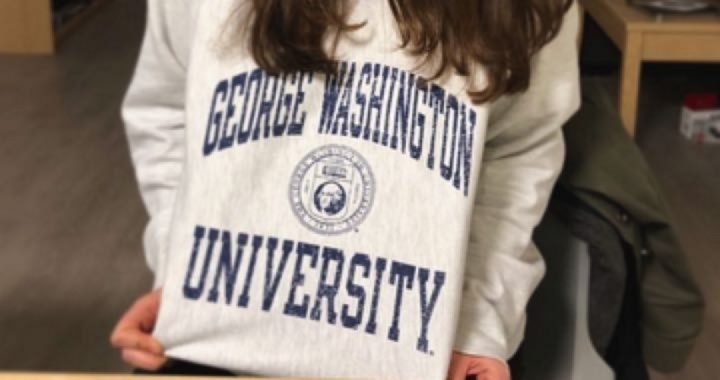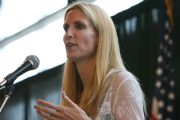
George Washington University is offering a workshop on April 5 that will focus on so-called white privilege and Christian privilege. According to the school’s Multicultural Student Services Center website, the workshop will “teach that Christians enjoy a privileged, easier life than their non-Christian counterparts, and that Christians possess ‘built-in advantages.’”
Entitled, “Christian Privilege: But Our Founding Fathers Were All Christian, Right?!” the workshop is hosted by the university’s Multicultural Student Services Center and is one of 15 “free training opportunities” offered by the center to “equip students and staff with the necessary skills to promote diversity and inclusion in the different environments.” Other workshops include “heterosexual privilege,” “cisgender privilege,” “able-bodied privilege,” “socio-economic privilege,” and “unconscious bias” — virtually all of the Left’s favorite talking points.
The Christian privilege workshop attributes Christian privilege to the misguided belief that most Christians are homogenous and mostly white. Its intent is to teach students how to recognize and address their privilege. The website explains that the seminar will discuss “what is meant by privilege overall and white privilege specifically,” the “role of denial when it comes to white privilege,” and the difference between “equality and equity.”
The description for the workshop relies on the Left’s tired misuse of the phrase “separation of Church and State,” which is not a constitutional construct (it’s not mentioned in the Constitution): “Even with the separation of Church and State, are there places where Christians have built-in advantages over non-Christians?” Their answer is yes. Of course, if leftists really think Christians have it so good, maybe they should just join a church. Too, if any of these people were truly Christian, they’d know the ludicrousness of their contentions. Any advantages white Christians have are not because they are part of some privileged club; it’s because they were raised with a strong work ethic and morals, which is also generally true of Asians (the wealthiest race in the United States — so much for white racism keeping minorities down). College itself proves the presenter wrong: Anyone who has searched recently for a college scholarship knows that there are loads of scholarships available to athletes, minorities, the poor, the physically and mentally disabled, to homosexuals and the transgendered, to the sexually and otherwise physically abused, and illegal immigrants, but not high-achieving, white students whose parents aren’t wretchedly poor, because they stayed together (as Christians should) and worked through their problems rather than take the easy route and get divorced (being a single mother is the single strongest determining factor in whether someone is in poverty or not). Of course, if one mentioned such a fact on a college campus, trouble would surely be forthcoming — the speaker wouldn’t be leading a diversity seminar on “minority privilege.”
The goal of the workshop is for attendees to be able to cite at least three examples of Christian privilege and three ways to ally with a non-Christian privilege by the end.
What the workshop seems to ignore completely is the overwhelming examples of Christian persecution that have taken place around the world and continue to take place today. Christians in North Korea and in predominantly Muslim countries in the Middle East and Africa, especially Afghanistan, are in danger.
And while the U.S. government does not sanction the type of persecution against Christians that can be seen in these countries, governmental policies have targeted Christians who dare to exercise their beliefs. How many Christian business owners have been punished for refusing to provide products or services to same-sex couples who sought marriage? Under ObamaCare, Christians have been forced to violate their beliefs by providing contraception coverage. Christians have been arrested in the United States for reading the Bible and participating in Bible studies on public property.
Christians on college campuses are particularly susceptible to persecution. According to the American Center for Law and Justice, several recent examples of discrimination against Christians highlight that anti-Christian sentiment is not exceptional but is in fact a trend. Two students were denied admission to the Radiation Therapy Program at the Community College of Baltimore County in 2015 because they made too many references to their Christian beliefs during the interview process. A student at Sonoma State University in California was asked to remove her cross during her 2013 orientation so that she would not offend other students. A student at Florida Atlantic University was reportedly ordered to write “Jesus” on a piece of paper and then stomp on it in 2013. Last year, a student at Northern Arizona University was ordered to leave a lecture hall after his professor objected to him reading the Bible before class began.
These are just a handful of examples of the kinds of discrimination against Christians that take place in the United States, and yet the workshop contends that Christians are somehow the lucky recipients of “unmerited perks from institutions and systems all across the country.”
Perhaps Timothy Kane can shed some light on the subject. The College Fix notes that the workshop will be hosted by Kane, interim associate director for inclusion initiatives at the school with a master’s degree in divinity and theology. Kane is devoted to “ensuring that all types of diversity at GW are celebrated and meant to feel included in campus culture and student life,” his online biography explains. The bio also states that Kane is a “proud gay member of the LGBT community” and hopes to “promote this kind of solidarity amongst the LGBT community, and work towards celebrating the richness of diversity” at George Washington University.
Of course, whether hosting divisive workshops would help to celebrate diversity or rather promote alienation is a matter of opinion.
Fortunately, any students who cannot get enough of Kane’s perspective can find him also hosting the “heterosexual privilege,” “cisgender privilege,” “able-body privilege,” and “socioeconomic privilege” workshops.
Image: Screenshot from a George Washington University online ad




